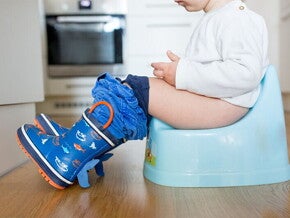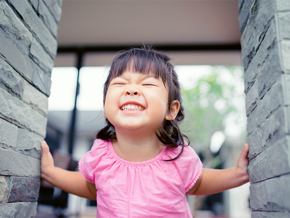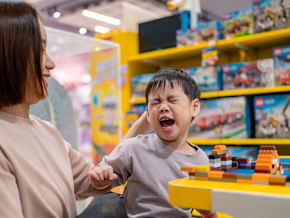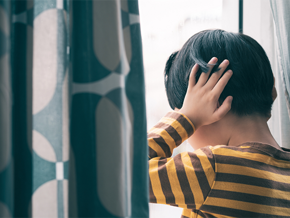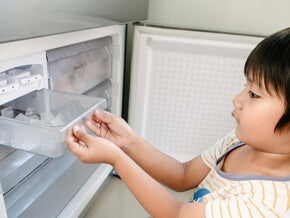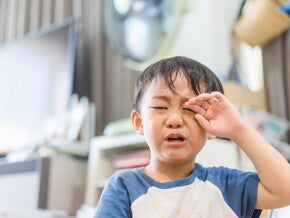
5 Ways to Relieve Constipation and Keep Your Child’s Digestion on Track
Constipation is one of the most common digestive issues in children. And while this condition is rarely serious, it's hard to watch your child struggle on the toilet, wincing in pain.
Before you start worrying about how much your child is eating, it's not just what they eat but how their body digests it that matters. Daily routines, bathroom habits, and even emotional stress can all slow things down.
Thankfully, most cases of constipation are brief. Read on to find tips for constipation relief and advice to keep your child's tummy running smoothly.
What Is Constipation?
Constipation in children happens when they have fewer than two bowel movements in a week. The stool is often dry, hard, and difficult to pass. There are two types of constipation: organic and functional.
Organic constipation
Organic constipation occurs when bowel movements become painful. The cause is due to underlying medical conditions such as celiac disease, thyroid dysfunction, or other disorders. Organic constipation is uncommon among children.
Functional constipation
Most children experience functional constipation, which means there's no medical issue or structural problem causing it. Based on a review of 50 studies involving over 311,000 children across Asia, about 1 in 8 children (12%) experience functional constipation. This is surprisingly high compared to the worldwide prevalence of 3% among kids.
Functional constipation can show up in healthy kids, and it's especially frequent in preschoolers. But Dr. Jennifer Olay, a pediatric gastroenterologist, writes in ParenTeam that most cases of functional constipation are temporary. However, understanding why it happens can make it easier to manage and prevent in the future.
What Causes Constipation in Kids?
Constipation can be caused by various factors, and it's more than just "not going enough to the toilet." It can happen when kids hold back their bowel movements after experiencing pain or discomfort while pooping.
Research shows that if parents push too hard during potty training, or if the child is really determined to do things their own way, the child's stress or anxiety can sometimes lead to constipation problems. Other kids ignore their urge to go because they are distracted with play or dislike using public toilets.
Some other common culprits are changes in routine, low-fiber diet, or not getting enough fluids. Some children may be sensitive to the ingredients in certain food or drinks. For instance, milk with complex fat blends or formulas, which are harder to digest, can lead to firmer stools or less frequent bowel movements.
What Are Constipation Symptoms?

Gastrointestinal infections can lead to constipation in kids.
Constipation doesn't always mean a child hasn’t pooped in a few days. Here are some tell-tale signs according to the American Academy of Pediatrics (AAP):
- Passing dry, hard stools
- Straining to poop or looking uncomfortable
- Pooping fewer than two times a week
When constipation worsens, severe symptoms can appear, including:
- Intense abdominal pain
- Having a bloated or swollen belly
- Decreased appetite
- Nausea or reflux
- Anal fissures (minimal blood loss caused by dry and hard stool tearing the skin around the rectum)
- Diarrhea from bowel overflow
Every age is different. If you have a baby, you can find here the causes and symptoms of constipation in babies.
Tips for Constipation Relief

Physical activity can help ease constipation in your child and promote regular bowel movements.
Even though you can find over-the-counter (OTC) laxatives for kids, check in with your child’s pediatrician for advice. In the meantime, here are some home remedies to help with constipation for kids 3 years old and up.
1. Increase fiber intake.
When dealing with constipation, adding more fiber to your child's diet can help. Dr. Olay suggests adding more fruits, veggies, and whole grains to your child's school baon. Fiber works like a natural laxative for kids, helping their intestines get things moving. Plus, high-fiber foods help with digestion and pack nutrients that keep the gut happy.
2. Encourage your kids to drink plenty of water.
Your kids need to stay hydrated especially when they eat more fiber. Drinking enough water and liquids helps move poop more easily through the intestines. Children need to drink more water when they're playing or if it's hot and humid outside.
3. Let your kids move more.
Regular exercise keeps the body healthy and gets your preschooler's digestive system moving, says Dr. Olay. So, encourage strolls around the neighborhood, running in the park, or just playing hide-and-seek at home.
4. Stick to regular mealtimes
The digestive system likes rhythm and routine, especially in kids. Sticking to regular mealtimes signals the colon to move stool along shortly after eating. It makes pooping more predictable—and a lot less stressful for your child.
5. Establish a healthy bathroom routine.
Getting your child to use the toilet at predictable times helps keep tummy troubles like constipation at bay. Have them sit on the toilet for 10 minutes at least twice daily, preferably after a meal.
Make sure they are relaxed and having a pleasant time. A reward system can make it much more fun, so you can hand out stickers or small treats when they successfully go potty and put up a poster to track their progress.
What If My Toddler Is Still Unable to Poop?
If dietary changes and routines do not offer immediate relief from constipation, reach out to your child’s doctor. They may prescribe stool softeners or laxatives to help clear blockages caused by accumulated stool. Follow your doctor’s instructions to give the proper dosage.
You can't solve constipation overnight. But knowing what might be causing it and helping your child's digestion with a gut-friendly diet can help get their tummy back on track. And remember: if things don't improve or if constipation becomes a recurring issue, your pediatrician is your best partner in finding lasting constipation relief.
What helped you when your child had constipation? Share your tips on ParenTeam’s Facebook group!
References
Paul Allen, Aniruddh Setya, and Veronica N. Lawrence, “Pediatric Functional Constipation,” StatPearls - NCBI Bookshelf, January 11, 2024, https://www.ncbi.nlm.nih.gov/books/NBK537037/.
“Constipation (for Parents),” n.d., https://kidshealth.org/en/parents/constipation.html.
The Children’s Bowel & Bladder Charity, “Constipation in Children: Symptoms, Causes and Relief,” ERIC, October 22, 2022, accessed April 8, 2025, https://eric.org.uk/childrens-bowels/constipation-in-children/.










